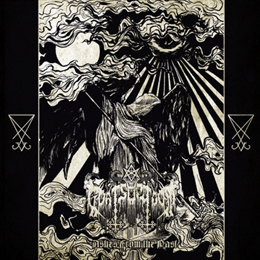
Goats Of Doom were formed as a solo-outfit by a young guy who calls himself Scaregod, and who was active under different monikers since his childhood. With Alesteir Alhazred he wrote and recorded a first demo in 2009, Perkeleen Luonti, and a second one a year later, entitled Herjaus Kaikkia Ihmisen Jumalia Vastaan. Then Geneholocaust joined the band, and the trio created Deathcult Ov Doomgoat, which was eventually released on a split with Dødcvlt. It led to a contract with Ewiges Eis Records. When also a fourth member joined, Hermeticus Wormius, Goats Of Doom started recording the material for what would become the band’s first full length, under the working title of Lost In Time And Void. Unfortunately, the recordings got lost, and it was a depressing moment for Scaregod and his crew. It took some time, but eventually Goats Of Doom started to work on a second album, which will be called Intra Ecclesiam Nulla Salus. The frontman wasn’t immediately pleased by the result, and the band started re-recording this stuff all over again. It will be released very soon, but since the recording process was extremely intense and demanding, Scaregod wanted to record and release something in the meantime, in order to clear his head. Thus came this EP.
Ashes From The Past is a three-tracker with material originally written in the very early years. The tracks have been re-arranged a little, and they come with other lyrics. The EP brings a melodic form of Black Metal strongly rooted in the tradition of the Old School (cf. the famous Second Wave, if you want to), with quite some variation in speed and song structures. Despite lacking of originality, Goats Of Doom’s approach is pretty characteristic and distinctive, with some identifying elements, such as the psychedelic keyboard lines and the epic hot-pepper-in-the-behind-attitude.
The production is very fine, for being decent and clean, yet not of the clinical kind, yet rather of the dusty kind. It’s a fine thing to notice that every player (read: all instruments) has its role to play without degenerating or fading into transiency.
Conclusion: makes me impatiently craving for Intra Ecclesiam Nulla Salus.
